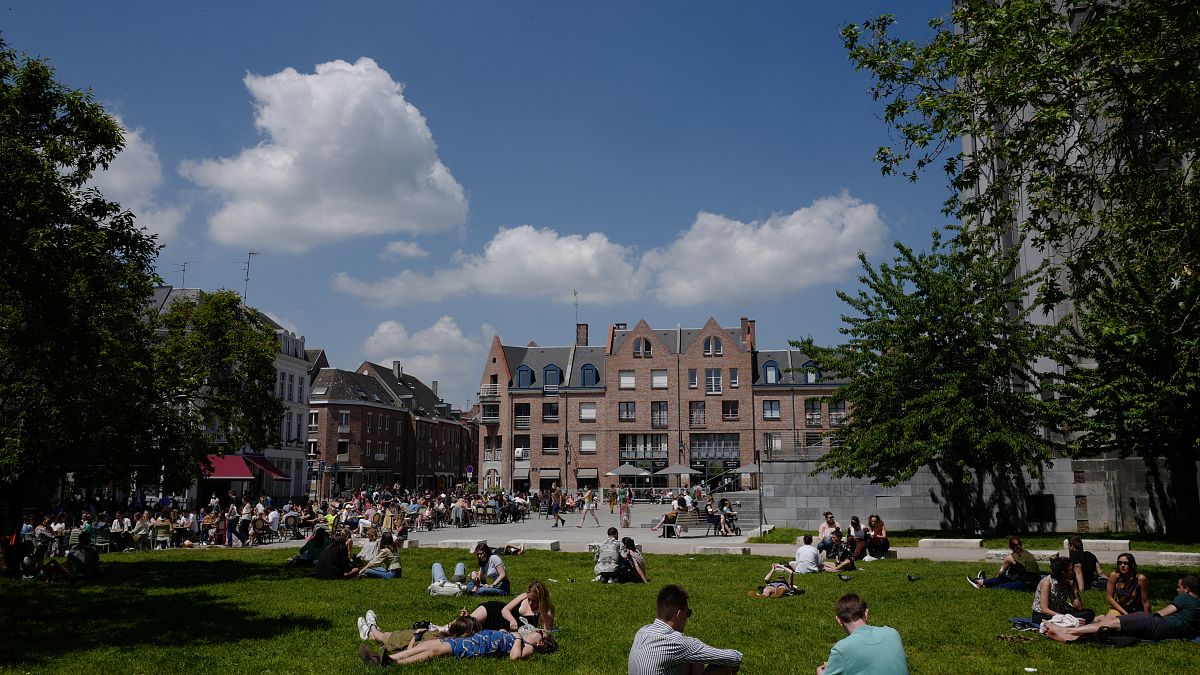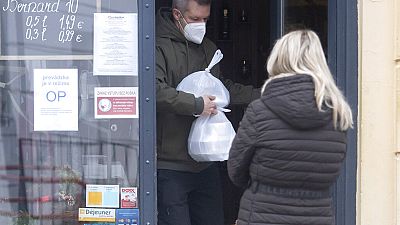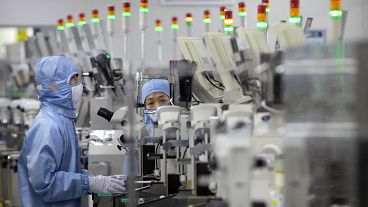Both the EU and the eurozone are set to expand by 4.8% in 2021, with 12 member states already offsetting all their economic losses this year.
The European Union's economic recovery is marching on thanks to the lifting of coronavirus restrictions, an acceleration of vaccination campaigns and a marked drop in infections and hospitalisations.
Both the EU and the eurozone are set to expand at equal rates: 4.8% this year and 4.5% in 2022. The figures represent an important improvement from the previous forecast of the European Commission, released in mid-May, which estimated a 4.2% growth rate for the bloc and 4.3% for the eurozone.
"[This] is the highest upward revision we have made in more than 10 years and is in line with firms' confidence reaching a record high in recent months," said Paolo Gentiloni, the EU's economy commissioner, while unveiling the summer forecast.
Real GDP is projected to return to pre-crisis levels in the last quarter of 2021, the Commission said.
In total, 12 EU countries will offset all their losses throughout this year: Estonia, Latvia, Lithuania, Luxembourg, Slovenia, Slovakia, Bulgaria, Denmark, Poland, Romania, Hungary and Sweden.
Ireland was the only nation that did not suffer a GDP drop in 2020.
The remaining 14 member states will have to wait until sometime in 2022 to completely recover.
Spain, the only country that registered a two-digit plunge last year (a dramatic 10.8% fall), will expand by 6.2% in 2021 and 6.3% in 2022, allowing the Southern nation to palliate all GDP damage.
"Overall, we have a very strong rebound. So the perspective of growth is better than we estimated in [the spring] forecast. Of course, this is, as always, not evenly distributed for all member states," Gentiloni told Euronews after the presentation.
"The risk of increasing divergences amongst member states is always there. We cannot exclude this. But I have to say that one of the main targets of the common European effort is to manage this risk and to reduce the divergence."
Consumption, employment and exports
The faster-than-expected recovery is based on several factors, chief among them progress in vaccination and the roll-out of effective measures to contain the spread of coronavirus, which have led to the gradual lifting of the restrictions that were constraining normal economic activity. The service sector, hard-hit during the winter COVID-19 wave, has particularly benefited from the reopening.
As of today, 62.7% of the adult EU population has received at least one dose of a COVID-19 vaccine, although inoculation rates are widely uneven across the bloc: Malta has vaccinated more than 82% of its population, while Bulgaria has only reached 14% of its citizens.
Private consumption and investment are credited as the main drivers of growth, with employment and the exports of goods also contributing to the rebound.
The Commission noted that there is evidence of "a revival in intra-EU tourist activity" which could be further boosted by the implementation of the EU Digital COVID Certificate. The system, which officially entered into force on July 1, enables tourists who have been vaccinated or have a negative PCR test to avoid travel restrictions while travelling inside EU territory.
"We have countries that are more [dependent] on international tourism and on air travel that will have a slower path to recovery," Gentiloni said, adding that others, who are less reliant on this industry, are likely to recover faster.
"But, overall, I think we will have a strong tourism season. But the message continues to be: vaccination, vaccination, vaccination."
Another factor behind the economic renewal is the EU's recovery fund, which is expected to generate wealth equal to 1.2% of the EU's 2019 real GDP. The European Commission is already raising money on the capital markets to finance the fund and will begin distributing cash among member states as soon as the first national recovery and resilience plans are approved by the EU Council, a green-light expected to arrive before the end of July.
Altogether, the circumstances create a positive outlook for the European Union. The bloc is currently recording some of the highest growth rates in its history.
Compared to the previous forecast, some EU countries see significant gains in their growth projections. Romania and Ireland enjoy the strongest gains: their economies will expand by 7.4% and 7.2%, respectively, up from 5.1% and 4.6% in the spring forecast. Belgium, Estonia, Slovenia and Hungary also experience considerable upgrades.
Delta and inflation threats
Uncertainty and risks to the EU's economic recovery remain high, Commissioner Gentiloni said.
The most immediate threat to the bloc's rebound is the spread of the Delta coronavirus variant, which is highly transmissible and able to infect those partly vaccinated. The mutation is spreading fast in countries like the United Kingdom, Portugal and Spain.
The European Centre for Disease Prevention and Control (ECDC) has warned that the Delta variant, first detected in India, could account for 90% of new coronavirus infections in Europe by late August.
Gentiloni also raised the alarm about vaccination inequality. According to Oxford's Our World In Data platform, only 1% of people in low-income countries have received at least one dose of a coronavirus vaccine. If the gap continues to widen, the EU's recovery could slow down.
The Commission is also concerned about an excessively early withdrawal of fiscal support, which could unleash a torrent of bankruptcy and insolvency and cause long-lasting damage.
The risk of high inflation is also present due to the massive levels of money that governments have pumped into the economy. Average inflation in the EU is forecast to be 2.2% this year and 1.6% in 2022, up from 0.7% in 2020.
Rising energy prices, production bottlenecks, shortages of key components (like semi-conductors) and strong domestic demand can also trigger a rise in consumer prices.
"Inflation may turn out higher than forecast, if supply constraints are more persistent and price pressures are passed on to consumer prices more strongly," the executive noted.
Looking beyond the short term, Gentiloni urged EU countries to ensure the post-pandemic recovery spawns a greener economy, in line with the bloc's climate neutrality goals.
"We have (transformed) the rebound in a more stable and sustainable growth."



